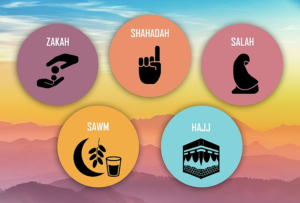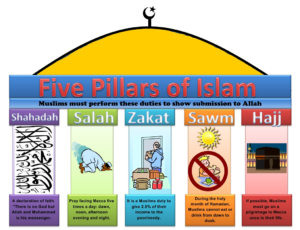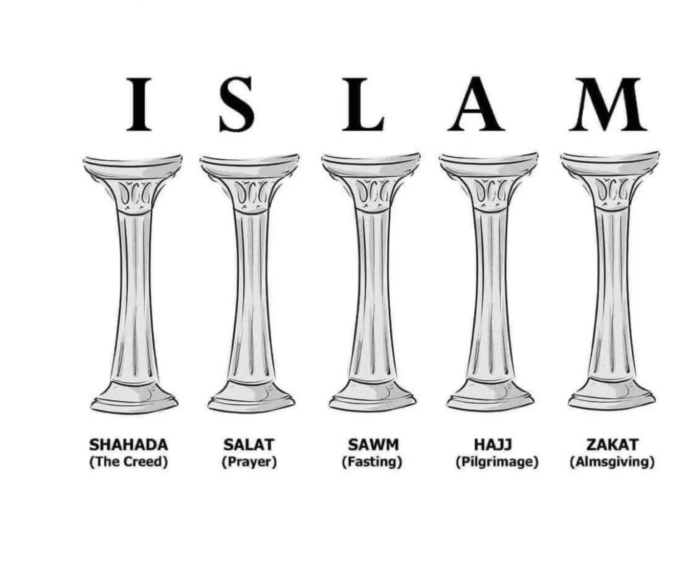5 Pillars of Islam
The Five Pillars of Islam are the fundamental acts of worship and the foundation of a Muslim’s faith and practice. These pillars are seen as the framework that shapes the life of every Muslim. They serve not only as acts of devotion to God (Allah) but also as guiding principles for leading a balanced, ethical, and purposeful life. The Five Pillars of Islam are:

- Shahada (Faith)
- Salat (Prayer)
- Zakat (Charity)
- Sawm (Fasting)
- Hajj (Pilgrimage)
Each pillar holds deep spiritual significance, and their practice is central to the Islamic faith. Let’s explore each of them in detail.
- Shahada (The Declaration of Faith)
The Shahada is the first and most important pillar of Islam. It is the declaration of faith and marks a person’s entry into the Muslim community. The full Shahada reads:
« Ashhadu an la ilaha illallah wahdahu la sharika lahu wa ashhadu anna Muhammad abduhoo wa rasuluh. »
This translates to:
« I bear witness that there is no god but Allah, and Muhammad is His servant and messenger. »
This simple but profound statement affirms the core belief of Islam: the oneness of God (Tawhid) and the finality of the Prophethood of Muhammad. For Muslims, this declaration is not only a verbal statement but also a commitment to living a life in accordance with the teachings of Islam. It emphasizes monotheism (belief in one God) and the acknowledgment of Muhammad as the last prophet sent to guide humanity.
By reciting the Shahada, a person affirms their commitment to the core values of Islam, embracing a lifestyle that adheres to the guidance of Allah and His messenger.
- Salat (Prayer)
Salat is the second pillar of Islam, and it refers to the obligatory prayers that Muslims perform five times a day. These prayers are a direct link between the worshiper and Allah, offering a moment of reflection, gratitude, and humility. The five daily prayers are:
- Fajr: performed before dawn
- Dhuhr: performed after midday
- Asr: performed in the afternoon
- Maghrib: performed just after sunset
- Isha: performed at night
Salat is a highly structured form of worship, with each prayer consisting of a specific number of units (Rak’ahs), each containing a set of physical actions such as standing, bowing, and prostration. The physical movements during prayer signify submission to Allah, reinforcing humility, discipline, and mindfulness.
The benefits of Salat go beyond the physical ritual. They help Muslims develop a closer connection to their Creator, allowing them to reflect on their purpose in life, seek guidance, and ask for forgiveness. Salat also serves to purify the soul and create a sense of unity among Muslims worldwide, as all perform the same prayers at the same times.
- Zakat (Charity)
Zakat is the third pillar and refers to the obligatory act of charity that every Muslim must give annually. It is not considered a voluntary donation but a duty. The word « zakat » means both « purification » and « growth, » signifying that charity purifies one’s wealth and helps it grow spiritually.
Zakat is calculated as a percentage (usually 2.5%) of a Muslim’s savings, investments, and assets, provided they exceed a certain threshold, known as the Nisab. The money collected through Zakat is meant to be distributed to the poor, orphans, those in debt, and others who are less fortunate. It is a means of wealth redistribution and serves to reduce inequality within the community.
The giving of Zakat is seen as an act of selflessness and an acknowledgment that all wealth belongs to Allah. It teaches Muslims to be humble and generous, ensuring that the needs of the less fortunate are met. Furthermore, Zakat helps cleanse the heart of greed and attachment to material possessions.
In addition to Zakat, Muslims are encouraged to give other forms of voluntary charity (Sadaqah) throughout their lives, which adds to the spiritual benefits of charity.
- Sawm (Fasting during Ramadan)
Sawm, or fasting, is the fourth pillar of Islam and involves abstaining from food, drink, and other physical needs from dawn until sunset during the holy month of Ramadan. Ramadan is the ninth month of the Islamic calendar and is considered the holiest month for Muslims. It is the time when the Quran was first revealed to Prophet Muhammad, making it a month of spiritual reflection, self-discipline, and community.
The fast is an exercise in patience and piety, designed to purify the soul and foster empathy for the less fortunate. By experiencing hunger and thirst, Muslims gain a deeper understanding of the struggles of those who are impoverished and are encouraged to increase their acts of charity during this time.
Fasting during Ramadan is not just a physical challenge, but a spiritual one. Muslims are urged to avoid sinful behavior such as lying, gossiping, and anger. They also focus on increasing their worship through extra prayers, reading the Quran, and performing good deeds.
At the end of Ramadan, Muslims celebrate Eid al-Fitr, a festive occasion marking the end of fasting, where they come together with family and friends to celebrate their achievements during the month and share meals with others.
- Hajj (Pilgrimage to Mecca)
Hajj is the fifth pillar of Islam, and it refers to the pilgrimage to Mecca, Saudi Arabia, which every Muslim is required to undertake once in their lifetime, provided they are physically and financially able to do so. Hajj takes place during the Islamic month of Dhul-Hijjah and is a gathering of millions of Muslims from around the world.
The pilgrimage involves a series of rituals that commemorate the actions of the Prophet Ibrahim (Abraham), his wife Hajar, and their son Isma’il. These rituals include walking around the Kaaba, the sacred building in the center of the Masjid al-Haram mosque in Mecca, as well as running between the hills of Safa and Marwah and standing at the plain of Arafat for a day of supplication and reflection.
Hajj is a deeply spiritual experience, symbolizing submission to Allah, seeking forgiveness, and seeking a fresh start. It is a time of unity, as all Muslims, regardless of their race, ethnicity, or background, gather in one place to worship the same God. The pilgrimage serves to remind Muslims of the transient nature of life and the ultimate goal of returning to Allah.

Key Takeaways :
Shahada (Declaration of Faith):
- The Shahada is the core belief in Islam: the oneness of Allah and the finality of Muhammad’s prophethood.
- It is a simple but profound declaration: “There is no god but Allah, and Muhammad is His messenger.”
- Reciting the Shahada signifies a Muslim’s commitment to the faith and is the foundation of their identity as a believer.
Salat (Prayer):
- Salat refers to the five daily prayers that serve as a direct link between a Muslim and Allah.
- These prayers are performed at specific times: before dawn (Fajr), midday (Dhuhr), afternoon (Asr), sunset (Maghrib), and night (Isha).
- Prayer is a way to maintain spiritual discipline, seek guidance, and purify one’s heart.
Zakat (Charity):
- Zakat is the obligatory charity given by Muslims, usually 2.5% of their wealth, to help those in need.
- It purifies wealth, reduces inequality, and fosters social responsibility and empathy.
- Zakat ensures that wealth circulates within the community and helps alleviate poverty.
Sawm (Fasting during Ramadan):
- Sawm is the act of fasting from dawn to sunset during the holy month of Ramadan.
- It involves abstaining from food, drink, and other physical needs, as well as controlling negative behaviors like anger and gossip.
- Fasting is a time for spiritual reflection, self-discipline, and empathy for the poor, while also being a way to increase one’s devotion to Allah.
Hajj (Pilgrimage to Mecca):
- Hajj is the pilgrimage to Mecca that every Muslim must undertake at least once in their lifetime, if able.
- It takes place during the Islamic month of Dhul-Hijjah and includes a series of rituals that commemorate the actions of Prophet Ibrahim (Abraham) and his family.
- Hajj serves as a spiritual reset, symbolizing unity, submission to Allah, and the Muslim Ummah (community) coming together from all corners of the world.
- What are the Five Pillars of Islam?
The Five Pillars of Islam are the fundamental acts of worship and practices that shape a Muslim’s faith and daily life. They are:
- Shahada (Faith)
- Salat (Prayer)
- Zakat (Charity)
- Sawm (Fasting)
- Hajj (Pilgrimage)
- What is the Shahada?
The Shahada is the Islamic declaration of faith. It affirms that:
- « There is no god but Allah. »
- « Muhammad is the messenger of Allah. » By reciting the Shahada, a person confirms their belief in the oneness of God (Tawhid) and the finality of Prophet Muhammad’s mission.
- How many times a day do Muslims pray?
Muslims are required to perform five daily prayers (Salat). These are:
- Fajr: Before dawn
- Dhuhr: Midday
- Asr: Afternoon
- Maghrib: Sunset
- Isha: Night
Each prayer includes physical movements like standing, bowing, and prostrating, as well as recitations of specific verses from the Quran.
- What is Zakat and how is it calculated?
Zakat is a form of obligatory charity. Muslims are required to give 2.5% of their savings and wealth annually to those in need, provided their wealth exceeds a certain threshold (Nisab). This practice helps to purify one’s wealth, reduce social inequality, and assist the poor and needy.
- What does fasting during Ramadan involve?
During the month of Ramadan, Muslims observe Sawm, fasting from dawn until sunset. This includes refraining from food, drink, smoking, and marital relations. Fasting is seen as an act of spiritual discipline and empathy for the less fortunate. The fast is broken each evening with a meal known as Iftar, and the pre-dawn meal before fasting begins is called Suhoor.
- Who must fast during Ramadan?
Fasting during Ramadan is obligatory for all adult Muslims who are in good health. Children, the elderly, pregnant women, nursing mothers, travelers, and those who are ill are exempt from fasting. However, those who miss fasting due to valid reasons are required to make up for the missed days later or provide food to the poor as a form of compensation.
- What is Hajj and when is it performed?
Hajj is the pilgrimage to Mecca, Saudi Arabia, which every Muslim is required to perform at least once in their lifetime if they are physically and financially able. Hajj takes place during the Islamic month of Dhul-Hijjah and includes several rituals that commemorate the actions of the Prophet Ibrahim (Abraham), his wife Hajar, and their son Isma’il.
- Can non-Muslims perform Hajj?
No, Hajj is only for Muslims. The pilgrimage to Mecca is a sacred religious act, and only Muslims are allowed to enter the city and perform its rituals.
- What is the purpose of the Five Pillars of Islam?
The Five Pillars of Islam are intended to guide a Muslim’s faith and actions. They help strengthen the connection with Allah, encourage ethical behavior, promote compassion, foster community unity, and ensure that Muslims live righteous lives. Each pillar serves to purify the soul and enrich the individual’s spiritual, emotional, and social well-being.
- Do the Five Pillars of Islam change over time?
No, the Five Pillars of Islam are constant and unchanging. They are based on the teachings of the Quran and the Hadith (sayings of Prophet Muhammad) and form the core foundation of a Muslim’s practice. While interpretations of their application may vary across cultures, the core principles remain the same.
- What happens if a Muslim doesn’t follow the Five Pillars?
While following the Five Pillars is a central aspect of being a Muslim, the consequences of neglecting them depend on individual circumstances, such as one’s knowledge, intent, and ability. In Islam, there is a strong emphasis on forgiveness and repentance. A Muslim who fails to fulfill any of the pillars is encouraged to seek forgiveness from Allah, make sincere repentance, and strive to fulfill their religious obligations in the future.
- Are the Five Pillars of Islam just rituals or are they connected to the Muslim’s everyday life?
The Five Pillars are not just religious rituals; they are deeply connected to a Muslim’s everyday life. For example:
- Shahada shapes the way a Muslim views the world and guides their actions.
- Salat helps Muslims maintain regular connection with Allah, giving them moments throughout the day to reflect and pray.
- Zakat promotes social justice and responsibility.
- Sawm encourages self-control, discipline, and empathy for the less fortunate.
- Hajj fosters a sense of unity and humility, reminding Muslims of the larger Muslim community.
- How does the Five Pillars of Islam promote equality?
The Five Pillars promote equality by emphasizing that all Muslims, regardless of their status, wealth, or background, are required to follow the same principles. For instance:
- Salat unites Muslims in prayer, no matter their social position.
- Zakat redistributes wealth to help those in need, reducing poverty and inequality.
- Hajj brings Muslims from all walks of life together in one place, showing that all believers stand equal before Allah.
- What is the spiritual significance of the Five Pillars?
The Five Pillars are designed to help Muslims build a stronger relationship with Allah and purify their hearts. By practicing these pillars, Muslims are reminded of the importance of humility, charity, discipline, and submission to Allah. Each pillar serves as a means of spiritual cleansing and moral development, guiding the individual to lead a life of righteousness.
- Can a Muslim choose to skip any of the Five Pillars?
The Five Pillars are mandatory for all adult Muslims who are capable of fulfilling them. However, there are exceptions based on personal circumstances, such as illness, travel, or financial hardship. For example, those who cannot afford to perform Hajj or Zakat due to financial limitations are exempt, and those who are ill or unable to fast during Ramadan can make up for missed fasts or provide charity instead.
Conclusion
The Five Pillars of Islam are the bedrock of the Muslim faith. Each pillar represents a key aspect of a Muslim’s relationship with Allah, the community, and the world around them. The Shahada emphasizes faith, Salat fosters connection through prayer, Zakat ensures social justice, Sawm instills discipline and empathy, and Hajj symbolizes unity and submission. By fulfilling these five pillars, Muslims aim to live lives that are spiritually rich, morally sound, and deeply connected to both their Creator and fellow human beings. Through these practices, they seek to purify their hearts, strengthen their faith, and contribute to a more compassionate world.
Check out this post : https://buzzrival.com/the-daily-5-prayers-of-islam/
Check out our insta : https://www.instagram.com/bsm_kitchens_design/
5 Pillars of Islam,5 Pillars of Islam,5 Pillars of Islam,5 Pillars of Islam,5 Pillars of Islam,5 Pillars of Islam,5 Pillars of Islam,5 Pillars of Islam,
5 Pillars of Islam,5 Pillars of Islam,5 Pillars of Islam,5 Pillars of Islam,5 Pillars of Islam,5 Pillars of Islam,5 Pillars of Islam,5 Pillars of Islam,
5 Pillars of Islam,5 Pillars of Islam,5 Pillars of Islam,5 Pillars of Islam,5 Pillars of Islam,5 Pillars of Islam,5 Pillars of Islam,5 Pillars of Islam,
5 Pillars of Islam,5 Pillars of Islam,5 Pillars of Islam,5 Pillars of Islam,5 Pillars of Islam,5 Pillars of Islam,5 Pillars of Islam,5 Pillars of Islam,



